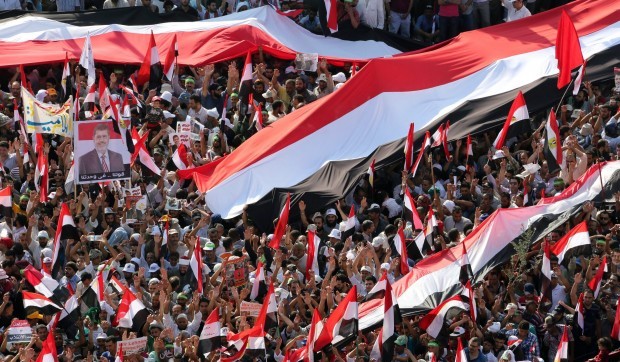Traces and imprints of regional rivalries over the conflict in Egypt are obvious. Saudi Arabia, the UAE and Kuwait provided billions of dollars in emergency aid to Egypt after the ouster of Mohammad Mursi.
Meanwhile, there was condemnation from Turkey against the swift power change in Egypt, sorrow in Qatar over the loss the Brotherhood, rage in Iran, and the panic in Gaza and Tunisia was felt by Hamas and Ennahda.
Beyond the region’s borders, Washington appeared in a state of alarm and confusion in the same manner that its institutions disputed the approach to Bahrain and Syria. Some congressional leaders have welcomed the ousting of President Mursi and considered him a fascist even if he was democratically elected.
President Barack Obama, however, has greeted Muslims for the holy month of Ramadan, made statements seen as favoring the Muslim Brotherhood and began carrying out penalties, such as halting military aid to the Egyptian army.
Many breathed a sigh of relief after the Brotherhood was eliminated. Egypt, under the slogan of democracy, was hijacked by people who don’t believe in democracy. Events during Mursi’s administration proved that the Brotherhood did not only intend to change Egypt internally, but to alter a regional formula followed since the era of late President Anwar Al-Sadat—a formula that divided the region into a Gulf camp against an Iranian camp.
No one can allege that toppling Mursi’s cabinet was carried out with foreign support. Toppling Mursi’s came as a natural result of the local struggle among Egyptian parties. The army favored the opposition’s stance, and the Brotherhood administration’s bad governance along with the Brotherhood’s bad relations with the opposing parties were the major reason millions took to the streets to spark a second revolution.
The repercussions of toppling the Brotherhood’s rule were huge. The cries we hear from Brotherhood’s supporters in the Gulf, Jordan and Tunisia are due to the substantial disappointment felt by groups who had thought they had a strong supporter and therefore strengthen their presence and plans. The floundering and screaming of the Brotherhood’s orphans expresses the size and of the hopes built on the rule of Mursi.
Since today’s Brotherhood is not a rational and pragmatic group, we don’t expect it to return to power because it has lost its most politically competent leaders, like Abdel Moneim Aboul Fotouh, and has become one that is run by an extremist party, with leaders like Khairat El-Shater, Mohammad Badie and Mursi. If they had been smart politicians, they would not have committed a series of mistakes that built enmities with their allies and facilitated the eruption of both a second revolution and a coup—happening together in a rare concurrence.
